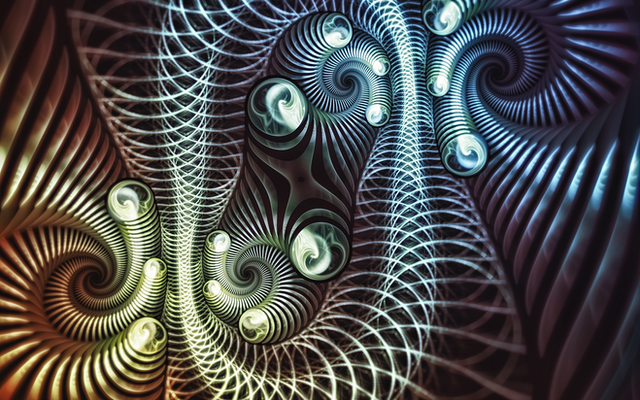HOME | DD
 Cosmic-Cuttlefish — Separation
Cosmic-Cuttlefish — Separation

Published: 2012-01-31 22:42:56 +0000 UTC; Views: 2568; Favourites: 47; Downloads: 45
Redirect to original
Description
The theory of non-overlapping magisteria is the view proposed by Stephen Jay Gould, who states that 'science and religion do not glower at each other, but interdigitate in patterns of complex fingering, and at every fractal scale of self-similarity.'I thought it was interesting that he chose to use fractals to explain the relation between science and religion - it's something I've tried to replicate here: the two elements are related and interlinked, but they are ultimately separate.
Made with Apophysis 2.09.
Related content
Comments: 10

I believe that Gould's theory can essentially be summoned up in "People can be more than one thing" and I believe it was a reaction to the idea among the religious community of a war against evolution and an intelligent design movement among the deeply religious as well as the New Atheist Movement and the Evolutionary Psychology groups that claimed that not believing in God wasn't enough, you had to essentially "evangelize" against religion itself. It was like there was a war going on between science and religion which Gould didn't really see the necessity for.
NOMA, and I personally support NOMA very deeply, says that since millions of scientists all over the world have no problem being both religious and working in a scientific field and that this doesn't cause them a big headache, why the conflict? According to a quote from Wikipedia: "Religion is too important to too many people for any dismissal or denigration of the comfort still sought by many folks from theology. I may, for example, privately suspect that papal insistence on divine infusion of the soul represents a sop to our fears, a device for maintaining a belief in human superiority within an evolutionary world offering no privileged position to any creature. But I also know that souls represent a subject outside the magisterium of science. My world cannot prove or disprove such a notion, and the concept of souls cannot threaten or impact my domain. Moreover, while I cannot personally accept the Catholic view of souls, I surely honor the metaphorical value of such a concept both for grounding moral discussion and for expressing what we most value about human potentiality: our decency, care, and all the ethical and intellectual struggles that the evolution of consciousness imposed upon us."
Basically, faith and by extension religion has plenty to teach us about things that science doesn't do a very good job of teaching and vice versa. Gould knew that while Science can tell us alot about the origin of man and that might be enough for him personally, he also accepted the idea that Science doesn't tell us much about man's place in the universe or his path as a person and society, for that Faith does a pretty good job for those that need it. Meanwhile, Faith does a shitty job of teaching us how the world's natural processes actually function. For that we have Science.
I personally believe in evolution as the best possible theory for explaining the presence of life on Earth, I also believe in God. Therefore, if I believe in the existence of a God who created Man and Man created Science to study the world around him, how can any thing Science teaches us be evil since it, ultimately, comes from God?
👍: 0 ⏩: 1

Thank you very much for taking the time to write this comment; I found it very insightful. Your explanation of NOMA makes a lot more sense than others I have heard. What I object to is the fact that a few of the religious believers I have spoken to about the relationship between science and religion have invoked the NOMA theory in order to say, essentially, that unless you are a follower of an established religion, you are not qualified to give your opinion on matters of ethics, metaphysics or any other philosophical issue. I don't see why proponents of religion are qualified to make metaphysical claims, whereas non-believers are not. I can only assume that this is a misinterpretation of Gould's theory, which by your explanation, actually sounds very reasonable.
In short, whilst I am not religious myself, I don't believe that there needs to be a conflict of 'science vs. religion', but I also don't believe that scientists should be forbidden to speak on philosophical issues, or religious believers forbidden to speak on matters of science, which seems to be what some people think.
👍: 0 ⏩: 1

I think a lot of people see NOMA as a wall between two kinds of thought, essentially saying "I have Science for this, this, this and I have Religion for this, this, and this and nary the tween shall meet". I think that's wrong. They have same function that teaches us different things and therefore both have an equal place in the marketplace of ideas of mankind. Scientists shouldn't be forbidden to speak on philosophical ideas and vice versa but we should just accept that people from different fields with different beliefs are going to reach different conclusions about the world around them.
That's not an easy idea for everybody to follow. Richard Dawkins has nothing nice to say about NOMA and believes religion genuinely shouldn't exist, while religious people scoff at the idea that NOMA pushes God to the "gaps".
I believe it's more a matter of just saying that our world is poorer without one or the other. That both lines of thought have an equal place in the human experience. That's the hard part for people to accept.
👍: 0 ⏩: 0

Thank you very much.
👍: 0 ⏩: 0

Thanks, I'm glad you like it! This one is a very zoomed-in section of a Curl tile - took a while to render.
👍: 0 ⏩: 0

oh my. I really like this one, Chris.
It is like...cells. and your colors are great...
anyway. I will examine your theory when I have a more positive brain pattern. and less headache pain...
but I will say this...I don't put much stock in religion. Faith on the other hand, I have that to overflowing.
👍: 0 ⏩: 1

Thanks Jess.
It's not my theory, though - actually, I disagree fairly strongly with what it suggests. Still, the separation in this fractal, and Gould's analogy reminded me of it. I'm not religious either (although I have nothing against those who are). I'm not sure about faith... Doesn't that imply a belief not based on evidence?
You have a headache? Hope everything's okay, and that you feel better soon.
👍: 0 ⏩: 1

welcome.
...yes, that could be a definition of faith, if you wish it to be.
This is what the internet says the definition is:
Complete trust or confidence in someone or something.
The thing is...people once thought the world was flat and that the sun revolved around us. It was belief, which has stronger connotation in fact than the word "faith." But they were faithful.
also...Until recently I had never experience romantic love, and this version was...not in full, and yet I would say I have faith, I believe in, romantic love. Even though I have no hard and fast evidence it exists. Who does, for that matter?
well. I still do. and I also hope everything is okay. My nurse is gone to Florida and that means I will...not take care of myself as I should. Because I will have faith that the meds I am already on will keep me safe. 
👍: 0 ⏩: 0

























